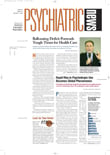Psychotropic drug prescribing for American youth has soared over the past several decades (Psychiatric News, February 7, 2003), and now it looks as though the same trend may be occurring in other countries, a new study indicates.
The study was headed by Ian Wong, Ph.D., director of the Center for Pediatric Pharmacy Research at the University of London. Results appeared in the December Archives of Disease in Childhood.
Wong and his coworkers obtained data about psychotropic prescribing for youth under 18 years of age in nine countries between 2000 and 2002. The countries included France, Germany, Spain, and the United Kingdom—the four European countries with the largest markets for these medications; Argentina, Brazil, and Mexico—the three Latin-American countries with the largest markets for these medications; and Canada and the United States.
Results indicated that the number of psychotropics prescribed for youth in all nine countries rose between the years 2000 and 2002, and seven of the nine countries showed a significant increase. The United Kingdom had the largest percentage increase at 68 percent, while Germany had the smallest, 13 percent.
Wong told Psychiatric News that the results did not surprise him.“ American data showed a similar trend a few years ago.”
He also indicated that he was not surprised to find that the United Kingdom is outpacing the United States in psychotropic prescribing for youth.
“The U.S. already had a high baseline, so it can't really grow as fast as the United Kingdom. There is no doubt, however, that we are catching up.”
Psychiatric News likewise asked Wong whether there was more of an increase in one category of psychotropic prescribing for youth in the countries of interest than in another category—say, more SSRI antidepressant prescribing than antipsychotic prescribing. Wong said that he and his coworkers have already learned that both SSRI and stimulant prescribing for youth increased significantly in the United Kingdom from 2000 to 2002, and that his team will now analyze more data from the United Kingdom and the other countries to further answer this question.
Why psychotropic prescribing is surging not just in the United States, but also in numerous other countries is not known. Wong and his colleagues, however, offer several possible explanations in their study report: “The increase probably represents the improved recognition of pediatric psychopathology; there is also a concern that drugs are being used to replace nondrug treatments.”
In any event, they pointed out, “The observed increase in so many countries should raise concern, as little research has been conducted in children to study the effects of most psychotropic medications” and because of the brouhaha about antidepressants' possibly increasing suicide risk in children (Psychiatric News, November 5).
“The use of psychotropic medications in children is a global public health issue,” Wong and his colleagues concluded, “which should be studied in partnership with pharmaceutical companies, governments, and researchers to grow and expand the evidence base for their use in children.”
“The problem with this type of psychotropic medication market research is that it contains no information about quality of the clinical treatment that is associated with the use of these medications,” Darrel Regier, M.D., executive director of the American Psychiatric Institute for Research and Education and director of APA's Division of Research, told Psychiatric News. “In the absence of associated data on the prevalence of treated and untreated mental disorders, and the degree to which use of these medications follow established treatment guidelines, the author is free to speculate about the implications of the increase in medication use in children.
“If one starts from a public health perspective that there is well-documented evidence of undertreatment of child and adolescent mental disorders in all countries and that there is an attendant high level of disability and waste of human potential because of the absence of treatment, then the evidence of increased use of psychotropic medications could be seen in very positive terms.
“If, on the other hand, one starts from a perspective that mental disorders don't exist and that medications are a means whereby poor parenting is being supported by inappropriate use of psychotropic medications, then there is a very negative spin for this information.
“My concern is that the author adds a negative spin with an incomplete reporting on the effectiveness data for psychotropic medications in children and adolescents.”
The study was funded by the Department of Health in England.
Arch Dis Child 2004 89 1131

